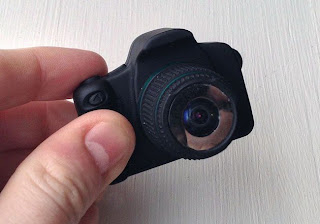 |
| Stop-sign camera heralds new era in surveillance |
The ubiquity of smartphones has put James Bond-style spy tools into everyone's hand, enabling us to secretly record video, audio and pictures, and instantly stream it all online. That can be a good thing when you catch junior hitting a home run and then send the video to grandma, or tag a family reunion picture for relatives who couldn't attend. But what if you snap a scofflaw parked in an illegal space and send the image to the local constabulary? That's what at least one company has proposed doing with an app.
Dubbed Spot Squad, the app is the brainchild of a Canadian startup in Winnipeg, Manitoba. The app still isn't live, and the company did not respond to a press inquiry, but the program raises some interesting possibilities. Peeved citizens could take pictures (complete with license plate numbers) of cars parked in, say, spaces intended for handicapped drivers, then beam the shot to parking patrols, who would in turn issue tickets. As an added incentive tipsters could get a cut of the ticket fine.
In essence, it turns everyone into a cop. No more double parking to pick up the kids or drop off your date. Some people may be appalled by the idea, but we're creeping slowly to the point where this may become an everyday occurrence.
For example, what was once simply a guaranteed way to fail your driving test, not coming to a complete halt at a stop sign is going to soon garner you an automatic ticket. In Washington, D.C., authorities are testing stop-sign cameras that would automatically issue tickets to practitioners of the infamous rolling stop. The cameras aren't live yet, but in D.C. they're keen on camera enforcement -- and for good reason. Cameras bring in money, lots of money.
Last year, it was reported that a single speed camera in Washington, D.C., had raked in $11.6 million in fines over the course of two years. Wouldn't it be great if each us got a cut of that revenue? Why not set up citizen speed traps?
While that figure sounds inflated, the speed cameras have certainly cost drivers in the nation's capital a pretty penny. Other municipalities have toyed with such surveillance, installing and then later eliminating such cameras, such as in Arizona and San Diego. Red light cameras are hidden in some cities; others warn drivers with conspicuous signs.
Red light cameras may save lives -- if they are installed at dangerous intersections, the length of the yellow light is increased, and they are clearly marked. However, installing them at every corner trying to catch drivers making mistakes may not be the way to go. It's a matter of over-policing. Why not, for example, start docking poor parallel parkers with a fine? It would strictly speaking be legal (you're too far or too close to the curb) and technologically possible but is it the right thing to do? Is that the kind of town you want to live in?
Some municipalities have jumped on the LPR (or license-plate reader) bandwagon as well, monitoring every vehicle to detect undesirables entering their town. Ostensibly a way for the police to find stolen cars or those reportedly involved in a crime, the LPR databases are also storing travel information on innocent motorists. And the information, which is only regulated in about a half dozen states, can be secretly used against you. In New York City, for example, the police department has been accused of using LPR programs to scan cars near mosques in order to find out who was attending services.
